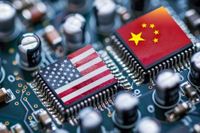The Trump Administration plans to modify the US government’s export rules for advanced computer chips, as announced by the Department of Commerce on Wednesday. This move involves scrapping the system established under President Joe Biden, which imposed restrictions on sophisticated chips used for artificial intelligence (AI) systems and technology exports. Instead, the administration aims to implement a global licensing regime that will rely on government-to-government agreements, according to sources familiar with the discussions.
The regulation issued in January 2025, known as the Framework for Artificial Intelligence Diffusion, was designed to maintain US leadership in AI while blocking China’s access to advanced chips that could enhance its military capabilities. A Commerce spokeswoman stated, “The Biden AI rule is overly complex, overly bureaucratic, and would stymie American innovation. We will be replacing it with a much simpler rule that unleashes American innovation and ensures American AI dominance.”
Last week, Reuters reported that the Trump administration was considering changes that would limit global access to AI chips, including the potential abandonment of the tiered system that categorized countries based on their access to advanced semiconductors. Under the Biden rule, the world was divided into three tiers: the first tier included 17 countries and Taiwan, which could receive unlimited chips; the second tier comprised about 120 countries with caps on the number of chips they could obtain; and the third tier included nations of concern, such as China, Russia, Iran, and North Korea, which were completely blocked from receiving chips.
According to the Commerce spokeswoman, officials “didn’t like the tiered system” and deemed it “unenforceable.” As the Biden rule is set to take effect on May 15, 2025, the Trump administration is still debating the best course of action regarding the new regulations.
In the wake of this announcement, shares of Nvidia, a leading AI chip designer, rose by 3% after the news broke, although they later dipped in after-hours trading. Nvidia’s shares were up nearly 2% in pre-market trading on Thursday, while stock of its competitor Advanced Micro Devices (AMD) also gained around 2%. Tech companies like Nvidia had previously urged Trump to eliminate Biden’s AI diffusion rule, arguing that it was an attempt to manipulate market outcomes and suppress competition.
However, some analysts have expressed concerns that a new licensing system could be even stricter than the one proposed by the Biden administration, potentially complicating business for chipmakers looking to operate internationally. Furthermore, Trump has indicated plans to impose tariffs on computer chips, possibly reaching as high as 25% in the coming months. The impact of such tariffs remains uncertain, especially since chips are often embedded in servers or smartphones.
AMD also addressed the US government's stricter export regulations in its latest business figures announcement. The company will no longer be permitted to sell AI accelerators that have been specifically tailored for China and fall below previous performance thresholds. Instead, export licenses will be necessary, and AMD does not expect to receive such licenses in the near future. Consequently, the company anticipates a loss of approximately $1.5 billion in sales for the current and upcoming quarters, with $700 million of that figure attributed to missed sales in the second quarter alone.
To put this in perspective, AMD’s entire data center division generated nearly $3.7 billion in sales during the first quarter, meaning the $700 million loss represents a significant portion of their revenue. The company expects that cross-product sales outside of China will help offset these losses, forecasting stable total sales of $7.4 billion. However, the lack of sales and inventory costs will likely reduce the net margin in the so-called non-GAAP figures from 54% to 43%. AMD anticipates expenses of up to approximately $800 million for inventories, purchase commitments, and related provisions in the second quarter.
Looking ahead, AMD plans to launch the revised Instinct MI350 accelerator series, which includes the Instinct MI355X, in Western markets toward the end of the year. The company has noted significant interest from Oracle, which could facilitate growth in the latter half of the year. However, Nvidia, which is currently leading in AI accelerator sales, is facing more severe repercussions from the export restrictions, with estimates suggesting a loss of $5.5 billion in turnover.
Meanwhile, Nasdaq 100 futures have risen over 1.3%, surpassing 20,100 points, fueled by optimism stemming from media reports suggesting that Trump intends to repeal strict AI-related regulations imposed by the Biden administration. Nvidia shares have climbed nearly 2% in pre-market trading, nearing the $120 mark. Investors are viewing this news as a positive indicator that could signal a potential thaw in strained relations between the U.S. and China, especially with negotiations scheduled for this weekend in Switzerland.
According to anonymous sources, the U.S. administration is planning to withdraw global restrictions related to chips amidst ongoing discussions about AI regulations. The Trump administration does not intend to enforce the AI diffusion rule set to take effect on May 15, 2025. This planned repeal, while not yet finalized, could pave the way for broader access to export markets and fewer regulatory constraints for AI firms and data center operators.
As Trump prepares for a trip to the Middle East, including visits to Saudi Arabia and the UAE—both of which have expressed dissatisfaction with the limits on acquiring AI chips—these developments are being closely monitored by investors and industry leaders alike. The proposed changes to the export regulations represent a significant shift in U.S. policy that could reshape the landscape of the global tech industry.


